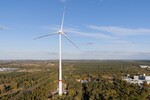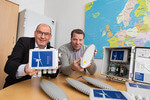News Release from windfair.net
Wind Industry Profile of
Giant energy storage facility planned in Bavaria, Germany
Siemens Smart Infrastructure and Zukunftsenergie Nordostbayern GmbH (ZENOB) have signed a letter of intent in Wunsiedel (Germany) for the turnkey construction of a battery storage facility with a capacity of 100 megawatts. The facility, with a storage capacity of 200 megawatt hours, is intended to contribute to the use of surplus renewable energy and cover peaks in demand in the electricity grid. The 5,000 square metre electricity storage facility can supply 20,000 average households with electricity for a year, Siemens announced.
"Electricity storage systems are an important building block for shaping the energy future," said Marco Krasser, Managing Director of SWW Wunsiedel GmbH, one of the partners involved in Zukunftsenergie Nordostbayern GmbH. "They can help stabilise the grid and make better use of renewable generation. They charge surplus electricity from the grid and discharge it when there is a higher demand for electricity. Smart storage technology increases the local and supra-regional supply of green electricity. That's why we are gradually expanding capacity."
In the planned lithium-ion battery storage system, which will be supplied by the manufacturer Fluence, large amounts of green electricity can be stored and discharged, which will thus no longer have to be regulated. This is because expensive, load-related peak loads can be avoided because they can be cushioned via the storage system.
"This also benefits the upstream grid operator, because it gives them more flexibility to compensate for voltage fluctuations that are increasingly occurring due to the expansion of renewable energy generation," said Bernd Koch, Chief Technologist Energy Performance Services at Siemens Smart Infrastructure, Germany. For the grid operator, the solution promises a significant relief. "Switching on and off the large industrial plants in the grid area requires a lot of electricity," said Siemens project manager Andreas Schmuderer. "Up to now, the grid operator had to keep considerable reserves for this. If these are eliminated in the future, this holds great potential for reducing carbon dioxide emissions in the local energy market."
- Source:
- Siemens
- Author:
- Windfair Editors
- Email:
- press@windfair.net
- Keywords:
- Siemens, storage, battery, Bavaria, Germany, plant, renewable energy, CO2, emissions, lithium ion, green, electricity, regulation, grid




















